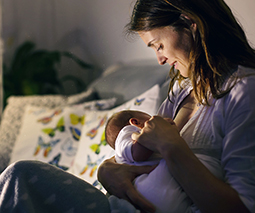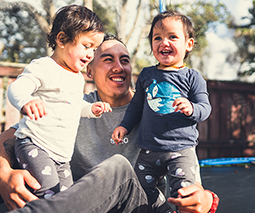The one thing you need to do to create healthy boundaries with your in-laws

Even when you have the best in-laws in the world, family relationships can become strained when you welcome your first baby. New routines, new demands, new parenthood (and new grandparenthood!) can lead to tense situations, even when everyone involved has the best of intentions.
Managing this time can be tricky, but there are things you can do to create harmony at home. Psychotherapist Ginny Lindsay, from Two to Three, shares some of the best ways to create healthy boundaries after baby.
Listen to Ginny Lindsay on Feed Play Love
With a new baby, comes new points of conflict
Becoming a family of three is a beautiful time, but it can also be a time when our personal differences are highlighted. Our expectations of what to do with a new baby are often informed by our own childhood experiences, but just as every person is different, so is every family, and if our partner’s and our in-laws’ experiences are very different from our own, we can find ourselves in situations where we clash.
Self-doubt sets in
When you’re given conflicting advice as a new parent it can be extremely stressful. Ginny explains that because of this clash, she’s seen many new mums start to doubt themselves. “They start to self-doubt and lose their confidence and lose their own self-esteem and self-belief about what they feel that they’re capable of doing … about what feels right.”
But try to remember that your in-laws (probably) mean well
For the most part, our parents-in-law have the best of intentions, but sometimes their idea of help is … unhelpful. Ginny says, “I think the big thing about in-laws is their intention is to support and to be there and to comfort … but often they’re not in the background, they actually come into the foreground. Sometimes too much.”
It’s true: dealing with in-laws is harder
Ginny says she’s seen situations where a new mum feels completely stuck when she’s being given different advice from both her own mother and her mother-in-law. It’s the latter that’s usually harder for a new mum to manage. “A lot of research has shown that a lot of the issues are between the mother-in-law and the daughter-in-law, coming in and interfering, because we can often just stand up to our own mother. But the difficulty is in being able to stand up to our mother-in-law, and that’s where a lot of resentment and a lot of discomfort sort of comes in.”

Our backgrounds shape our expectations
Differences of opinion on baby care and parenting can cause conflict, and cultural differences can also add to the strain. Ginny explains that new grandparents who are accustomed to extended family being involved in the care of a new baby, may assume they will also have the same level of involvement with your baby.
The grandparent’s intentions, Ginny explains, are well-meaning. “Their heart is in such a great place. But what happens is they don’t leave any space for the nuclear of this new family to bond and create their own rules and expectations and values. And so that’s where the difficulties start to come in. Because these well-intentioned in-laws, or grandparents, are quite often just really interfering, even though they don’t mean to be.”
Create boundaries and speak with sensitivity
For a new mum, letting her partner know that her in-laws are causing her stress is incredibly difficult. Ginny says that communication is important, but speaking with sensitivity about your partner’s parents, and making clear requests for what you need, is key. Once it’s been discussed between you and your partner and you’ve come up with boundaries you both agree on, it’s up to each of you to discuss them with your family of origin. Ginny explains, “If it’s my mother that [I] was having the issue [with], I must address it. And if it was my partner’s, he must address it with his family so it’s not cross-referenced.”
In heterosexual couples, women are often put in the position of running comms for all family members, but Ginny says that creating harmony is the responsibility of both the new parents.
“It must come from the actual son or daughter directly back to their family. Because really at the end of the day, we are wanting to protect our unit. We’re wanting to put clear boundaries. But we’re also wanting our in-laws to feel welcome and loved to come into the house. So it’s creating that balance of protecting your own unit, but being able to put up the boundaries to protect and welcome the others to come into your house.”









